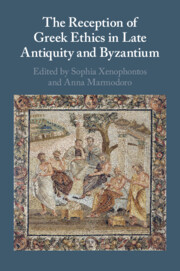Book contents
- The Reception of Greek Ethics in Late Antiquity and Byzantium
- The Reception of Greek Ethics in Late Antiquity and Byzantium
- Copyright page
- Contents
- Tables
- Contributors
- Acknowledgements
- Abbreviations
- Introduction
- Part I Ethics across the Late-antique and Byzantine Period
- Chapter 1 Sexual Difference and the Difference It Makes
- Chapter 2 Ethics and the Hierarchy of Virtues from Plotinus to Iamblichus
- Chapter 3 Neoplatonic Contemplative Ethics
- Chapter 4 Ethics, Virtue and Theurgy
- Chapter 5 Imitation and Self-Examination
- Chapter 6 The Reception of Greek Ethics in Christian Monastic Writings
- Chapter 7 Understanding Self-Determination and Moral Selfhood in the Sources of Late-antique and Byzantine Christian Thought
- Chapter 8 ‘Singing with David and Contemplating Agesilaus’
- Part II Prominent Ethical Views of the Time
- Bibliography
- Index Locorum
- Index of Names and Subjects
Chapter 5 - Imitation and Self-Examination
The Later Neoplatonists on the Platonic Dialogue as Moral Education through Visualisation
from Part I - Ethics across the Late-antique and Byzantine Period
Published online by Cambridge University Press: 15 June 2021
- The Reception of Greek Ethics in Late Antiquity and Byzantium
- The Reception of Greek Ethics in Late Antiquity and Byzantium
- Copyright page
- Contents
- Tables
- Contributors
- Acknowledgements
- Abbreviations
- Introduction
- Part I Ethics across the Late-antique and Byzantine Period
- Chapter 1 Sexual Difference and the Difference It Makes
- Chapter 2 Ethics and the Hierarchy of Virtues from Plotinus to Iamblichus
- Chapter 3 Neoplatonic Contemplative Ethics
- Chapter 4 Ethics, Virtue and Theurgy
- Chapter 5 Imitation and Self-Examination
- Chapter 6 The Reception of Greek Ethics in Christian Monastic Writings
- Chapter 7 Understanding Self-Determination and Moral Selfhood in the Sources of Late-antique and Byzantine Christian Thought
- Chapter 8 ‘Singing with David and Contemplating Agesilaus’
- Part II Prominent Ethical Views of the Time
- Bibliography
- Index Locorum
- Index of Names and Subjects
Summary
This essay explores the views of Neoplatonic commentators (e.g. Proclus and the anonymous Prolegomena to Platonic Philosophy) on the relation between Plato’s ethical philosophy and the literary format of the Platonic dialogue. It focuses in particular on the role of visualisation in the process of moral education. The Neoplatonists praise Plato’s dialogues for their 'vividness' (enargeia). They hold that the vivid depiction of good characters (e.g. Socrates) promotes imitation of similar manners, whereas the equally vivid depiction of bad characters (e.g. the ambitious Alcibiades) invites critical self-examination. The Neoplatonists develop their view in part in response to the Stoics, who had argued that moral education should be restricted to the teaching of bare moral rules. The difference between the Stoic and Platonic view on the importance of literature in moral education can be explained from their differing views on the constitution of the human soul. Whereas (most) Stoics hold that the entire soul is rational, the Platonic tradition acknowledges the non-rational aspect of the human soul and holds that moral education should address both the rational and non-rational. Modern psychological research corroborates the Platonic position on the human soul and the need for (literary) examples in moral education.
- Type
- Chapter
- Information
- Publisher: Cambridge University PressPrint publication year: 2021



